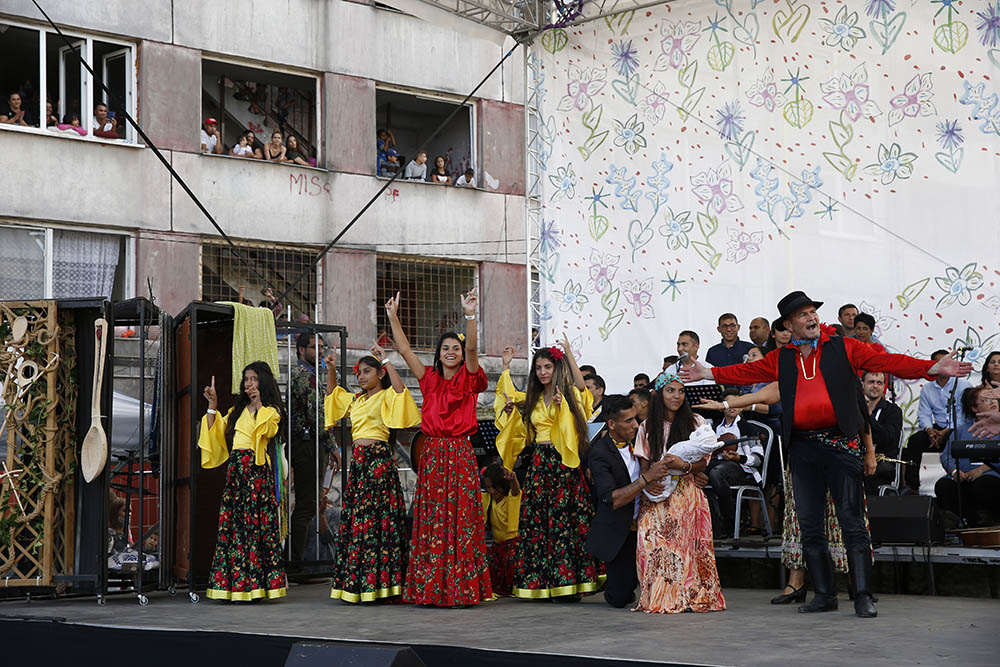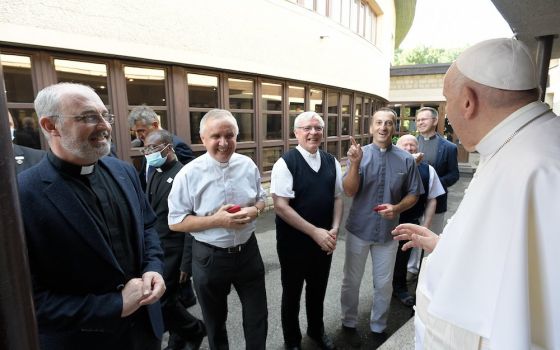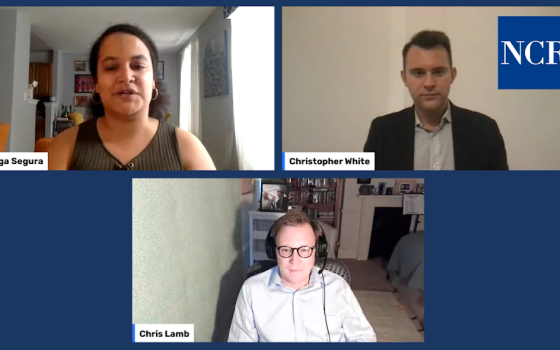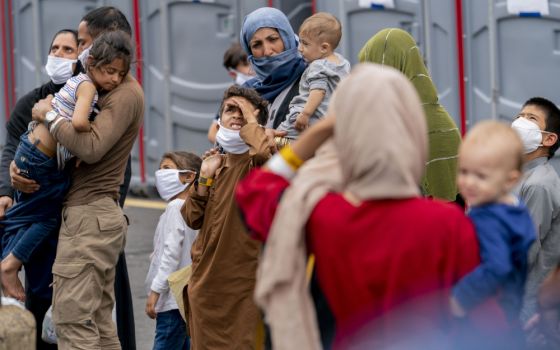
Performers entertain before Pope Francis' meeting with the Roma community in the Luník IX neighborhood in Košice, Slovakia, Sept. 14. (CNS/Paul Haring)
Editor's note: This story has been updated with reporting from Pope Francis' meeting with young people.
KOSICE, SLOVAKIA — No one should be kept away from the church, Pope Francis said on Sept. 14, as he visited an ostracized Roma community and condemned the segregation and discrimination that has long plagued Slovakia's second largest city.
"In the church, no one ought ever to feel out of place or set aside," he said, later adding that "nobody ought ever keep you or anyone else away from the church!"
During his visit to the marginalized neighborhood of Lunik IX on the outskirts of Košice, the pope told the ethnic minority that prejudice has no place in the Christian life.
"The church is indeed a home; it is your home," he said. "So I would say to you with my whole heart: You are always welcome! Always feel at home in the church, and don’t ever worry about whether you will be at home there."
Košice is home to a predominantly socially segregated Roma population of 4,300, the largest in the country, where many residents live without heat, water or electricity. During his visit here, Francis denounced the way in which the community had been shunned by much of Slovakian society.
"You have been the object of prejudice and harsh judgments, discriminatory stereotypes, defamatory words and gestures," he told them. "As a result, we are all poorer, poorer in humanity."
"Restoring dignity means passing from prejudice to dialogue, from introspection to integration," he said.
Francis has met with Roma people, nomadic communities sometimes referred to as Gypsies, at the Vatican and on past foreign travels, building on a tradition he began as archbishop of Buenos Aires, Argentina. During his 2019 visit to Romania, he asked for forgiveness for the church's sins of discrimination against the Roma.
As he sat in the heart of Lunik IX, with throngs of Roma people crowded onto their apartment balconies and craning their necks out of windows to get a glimpse of the pope, Francis heard firsthand testimonials of realities of life in the community, both attesting to trials and hardships but also accounts of unexpected joy.
Ján Hero, a 61-year-old Roma and a father of five, told the pope that his continued commitment to the Roma people has been a source of encouragement to him and his family.
"We believe that Jesus Christ helps us to overcome tensions in living together with the majority and other ethnic groups," he said to Francis.
For the last 15 years, Salesians of Don Bosco priests have lived among the Roma people in Košice. Ahead of the pope's arrival, Salesian Fr. Marian Peciar told NCR that their goal was to be close to the young generation and the poor among them.
"We are simply doing what Don [John] Bosco wrote in our constitution," he said of the religious order's 19th-century founder who lived among the poor and disadvantaged.
Advertisement
Peciar said that many Slovaks were ashamed that the pope would draw the eyes of the world to the destitute community, but that for the priests and religious living among them, it provided a morale boost, knowing that their work had Francis' backing.
"If Pope Francis is happy about our work, we are so happy about it, too," he said.
One young married Roma couple, Nikola and René Harakaly, told the pontiff that they had grown up in the district and despite difficulties, were encouraged by the local priests to receive the sacraments and get an education.
Today, they have managed to buy their own home in another neighborhood in Košice where they live with their two toddler boys.
Francis said the community's "concrete experience of living together" is how many stereotypes that "otherwise seem insurmountable" may be overcome and heeded others to follow their example.
"It is not easy to leave prejudice behind, even for Christians," he lamented. "It is not easy to value others, especially if we see them as problems or enemies; if we pass judgment without making any effort to get to know them and to listen to their stories."
"How often are our judgments really prejudices, pre-judgments? How often do we rest content with labels?" the pope responded. "In this way, we disfigure by our words the beauty of the children of God, who are our brothers and sisters."
"People cannot be pigeonholed" or reduced to "pre-packaged ideas," the pope said. "Our knowledge and appreciation of others must be grounded in our acknowledgment that each of them possesses the inviolable beauty of a son or daughter of God, a reflection of the creator’s image."
In encountering the marginalized, the pope told the crowd, that is where one meets Jesus.
"He awaits you wherever there is need, not comfort; wherever service rules, not power; wherever incarnation, not self-indulgence, is required," said Francis. "Those are the places where he will be found."
Following his meeting with the Roma people, the pope reiterated his plea to embrace to be unafraid to welcome and embrace the other when he met with a roaring crowd of over 20,000 young people at nearby Lokomotiva stadium.
"Embracing helps us overcome fear. Whenever someone embraces us, we regain confidence in ourselves and in life," said Francis.
"So let us allow ourselves to be embraced by Jesus," he continued. "Because when we embrace Jesus we once more embrace hope."







